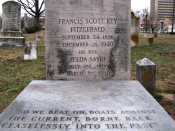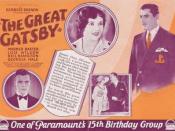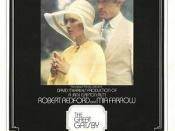"What goes around comes around." This is ultimately the message delivered by F. Scott Fitzgerald in his novel, The Great Gatsby - that retribution for one's actions is inevitable. He demonstrates this point through the novel's ending and, more specifically, the death of Jay Gatsby. Gatsby's untimely murder is essentially the only possible conclusion for the novel to express Fitzgerald's point - since the ending is justice being served for Gatsby's actions and the way he leads his life, as well as the actions and behaviour of the other characters. Gatsby's illegal business activities and wild parties, his attempted destruction of a marriage for his own personal glory, as well as the distasteful and careless conduct and actions of the other characters - specifically Tom, Daisy, and Myrtle - are all factors that contributed to Gatsby's inevitable end.
Firstly, Gatsby's own attempt to attain the American Dream, or at least his corrupted image of it, is a major contributing factor making him deserving of the retribution he receives.
The so-called American Dream is the ideal that hard work will result in prosperity in all aspects of life, but monetarily in particular. Jay does anything and everything to become successful, both financially and in society - and in doing so bends his morals. Exactly how Gatsby becomes so wealthy is unclear, but several ideas are proposed and suggested, either by guests at his many parties, his many acquaintances - namely the shady Meyer Wolfshiem, or himself: " 'Somebody told me he killed a man once,'" (Fitzgerald 45), and " 'It's more that he was a German spy during the war,' " (Fitzgerald 45). These are two quotations of explanations that guests give of Gatsby's past, however he tries to clear rumours himself but never really explains what he does: "'Oh,


